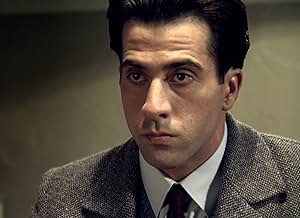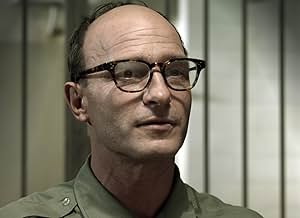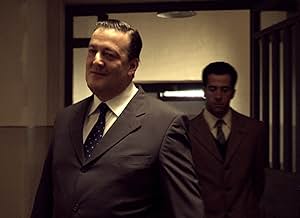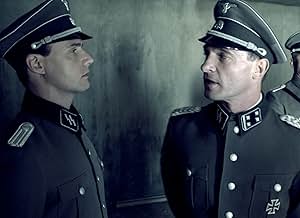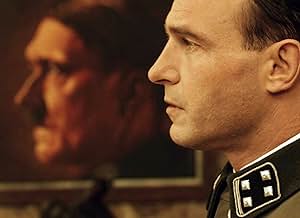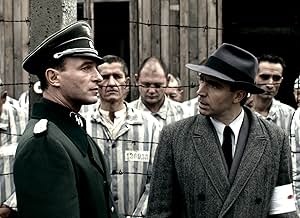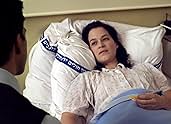VALUTAZIONE IMDb
5,9/10
3661
LA TUA VALUTAZIONE
La vita di Adolf Eichmann, uno dei più importanti gerarchi nazisti, ricostruita attraverso la confessione fatta prima di essere giustiziato in Israele.La vita di Adolf Eichmann, uno dei più importanti gerarchi nazisti, ricostruita attraverso la confessione fatta prima di essere giustiziato in Israele.La vita di Adolf Eichmann, uno dei più importanti gerarchi nazisti, ricostruita attraverso la confessione fatta prima di essere giustiziato in Israele.
- Regia
- Sceneggiatura
- Star
Avner W. Less
- Self
- (filmato d'archivio)
- (voce)
Tereza Srbova
- Baroness Ingrid von Ihama
- (as Tereza Srbová)
Tilly O'Neil
- Hannah
- (as Tilly Golding)
Recensioni in evidenza
There are a lot of things about "Eichmann" which seem curiously wrong. For one thing, this Eichmann is a lot more interesting and colourful than the real man appears to have been. There's a bizarre scene in which he is challenged by his very weird Hungarian mistress to shoot a baby; I won't give away whether or not he does so, but it's not something I've ever heard of before. This Eichmann is a womaniser, a bit of a boozer, altogether a more louche and raffish figure than the rather dull bureaucrat that I've always read Eichmann described as.
Yes, the film suffers from some weird accents. Thomas Kretschmann, as Eichmann himself, speaks in a clipped German accent; Troy Garity, Franka Potente and Stephen Fry (in a bizarre but oddly convincing performance as, of all things, the Israeli Minister of Justice) all have indeterminately foreign accents, and none of it really makes sense.
Having said that, Kretschmann carries off the job he has been asked to do, and Garity is really very good as Avner Less, who was not Eichmann's prosecutor (as someone else stated) but his interrogator. Less was not a lawyer but a police officer. The subplot of his wife being chronically ill is presumably there because it was true; it would have been better if they'd left it out, because what drama there is in this film is the battle of wills between Less the dogged interrogator and Eichmann the stolidly evasive interrogatee.
I note in passing that Stephen Fry might almost be the rather more well-fed first cousin, or perhaps uncle, of Ciaran Hinds in "Munich". The accent is the same, and the tallness, slicked-down hair and intimidating bulk is very similar.
If they'd toned down the lurid stuff about Eichmann's sex life and focused on what he actually did for a living, this could have been as good as "Conspiracy". Pity.
Yes, the film suffers from some weird accents. Thomas Kretschmann, as Eichmann himself, speaks in a clipped German accent; Troy Garity, Franka Potente and Stephen Fry (in a bizarre but oddly convincing performance as, of all things, the Israeli Minister of Justice) all have indeterminately foreign accents, and none of it really makes sense.
Having said that, Kretschmann carries off the job he has been asked to do, and Garity is really very good as Avner Less, who was not Eichmann's prosecutor (as someone else stated) but his interrogator. Less was not a lawyer but a police officer. The subplot of his wife being chronically ill is presumably there because it was true; it would have been better if they'd left it out, because what drama there is in this film is the battle of wills between Less the dogged interrogator and Eichmann the stolidly evasive interrogatee.
I note in passing that Stephen Fry might almost be the rather more well-fed first cousin, or perhaps uncle, of Ciaran Hinds in "Munich". The accent is the same, and the tallness, slicked-down hair and intimidating bulk is very similar.
If they'd toned down the lurid stuff about Eichmann's sex life and focused on what he actually did for a living, this could have been as good as "Conspiracy". Pity.
I do not typically submit such reviews, but this film cries out for comments. "Using" the inherently dramatic and compelling nature of the Nazi period to create a largely inaccurate film seems to be another kind of crime. Such a period of evil deserves the most sober treatment possible and should not be used to create a kind of historic horror film.
All of that is leading up to my strong suggestion that you skip the film and read Hannah Arendt's amazing book about the actual Eichmann trial in Jerusalem, Eichmann: A Report on the Banality of Evil. Here you will find a non-dramatic, non-titillating version of the story that neither exaggerates nor diminishes Eichmann's evil, but rather reveals him in a matter-of-fact way as an opportunist, a careerist who merely wanted to advance, climb the ladder, attain the next "title," etc. He apparently did not have any particular hatred toward Jews. None of this in my estimation makes him less evil; the book actually reveals the "banality" of his evil by taking away the specter of a crazed monster. His evil lies in its being sane and in a sense "ordinary." Therefore, given its serious subject matter, I feel the film only partially reflects the facts Arendt reveals so clearly, obscuring them with with sex and useless side stories. The performances are good, the film is well made, etc. That's not my point. If you want to make a formulaic film, a horror film, a sexy film, or any other kind of film, have at it. But don't use Eichmann as your subject matter. The subject matter is too serious to be misused in any way. Read the book, please.
All of that is leading up to my strong suggestion that you skip the film and read Hannah Arendt's amazing book about the actual Eichmann trial in Jerusalem, Eichmann: A Report on the Banality of Evil. Here you will find a non-dramatic, non-titillating version of the story that neither exaggerates nor diminishes Eichmann's evil, but rather reveals him in a matter-of-fact way as an opportunist, a careerist who merely wanted to advance, climb the ladder, attain the next "title," etc. He apparently did not have any particular hatred toward Jews. None of this in my estimation makes him less evil; the book actually reveals the "banality" of his evil by taking away the specter of a crazed monster. His evil lies in its being sane and in a sense "ordinary." Therefore, given its serious subject matter, I feel the film only partially reflects the facts Arendt reveals so clearly, obscuring them with with sex and useless side stories. The performances are good, the film is well made, etc. That's not my point. If you want to make a formulaic film, a horror film, a sexy film, or any other kind of film, have at it. But don't use Eichmann as your subject matter. The subject matter is too serious to be misused in any way. Read the book, please.
When a film's starting sentence is 'based on a true story' or if you know that the story behind the film actually took place, you expect at least the facts to be close to reality. I'll put aside the embarrassing mistakes in Hebrew (didn't you have Israeli actors on the set?), what troubles me more is the inaccuracies in historical facts, and the actual 'creation' of allegedly legal documentations that never existed. Furthermore, the addition of plot lines that portray Eichmann as a brutal murderer, and as a 'valentino', are not correct, add nothing to the plot (apart from the female nudity, which is entirely not required in this movie), and miss the horrible fact that Eichmann, like many many officers in the German Reich was a gray man, who just filed documents that sent millions to their death. This movie is a shame for the viewers' intelligence. Ignoring the historical errors and the made up plot lines, the movie itself is not interesting, the characters are superficial and empty, and if there's an intention to create a 'duel' between Eichmann and Less, it is artificial and is futile.
EICHMANN is not an easy film to view: revisiting the atrocities of the Nazi Third Reich through the greasy, smooth, denying words of Adolf Eichmann is a nightmare, but a nightmare we must revisit periodically to remind us of just how heinous was that period of history. The film is set in 160 - 1962 and is based on transcripts obtained by the Israeli forces from the files of the concentration camps and Nazi regime, transcripts that document the words of Adolf Eichmann that lead to his final confession of his participation in the Third Reich atrocities as unveiled under the slow and insidious interview by Police Captain Avner Less.
The film opens after the 1960 capture of Eichmann from his home in Argentina, the country where he and his wife and four sons had been in hiding since the end of WW II. Adolf Eichmann (brilliantly portrayed by Thomas Kretschmann) had been the World's Most Wanted Man and his transport to Israel was met by jeering crowds. The Israeli Minister Tormer (Stephen Fry) elects police captain Avner Less (Troy Garity) to conduct the interview in what is supposed to be a top-secret assignment. But the news escapes and Avner's wife Vera (Franka Potente), suffering from polio of the spine, and the Avner children are marked as targets by the Israeli's who do not appreciate the duty of Avner Less's obligation to interrogate and gain a complete confession from Eichmann before he can be tried. The months that the interrogations take prove that the Israeli's believed in justice: the facts must be proved completely before the prisoner is tried for atrocities.
During the interrogation months Eichmann is shown in flashbacks to have been not only following the orders of Hitler, but being committed to the purification of the 'Aryan race'. What screenwriter Snoo Wilson and director Robert Young allow is for us to see the human weakness of Eichmann as portrayed By Kretschmann: he had mistresses, including one Austrian Jewess and a Hungarian Countess who urged him to complete the Final Solution, he coldly signed extermination orders 'because he had to follow Hitler's orders', yet he also was an apparently devoted father to his own sons. Equal time is given to allow the audience to see the interaction between the conflicted parties of the interrogation: Avner was convinced he must prove beyond a shadow of a doubt that the prisoner was indeed guilty of all of the crimes fro which he was accused. The interrogations become a battle of wills between the smarmy, oily, manipulative Eichmann and the personally distraught Avner. At the close of the film the real Avner E. Less provides voice over regarding the hanging of Eichmann along with statistics of the Nazi atrocities that no matter how often they are quoted continue to astonish our ability to comprehend.
The only artistic aspect of the film that is ultimately distracting is the director's choice to have cinematographer Michael Conner use near black and white/sepia toning for the film. Certain scenes break into real color but the tone of the film footage seems dirty - and perhaps that is the reason for the choice. Richard Harvey adds the musical score, and there are some very fine cameo roles by Delaine Yates, Tereza Srbova, and Judit Viktor. But in the end it is the performance by Thomas Kretschmann that is terrifyingly real: he deserves awards for his courage to accept this role and for his unforgettable impersonation of a man so evil that under other actor's skills would be simply unbelievable. It is Kretschmann's extraordinary performance that brings home the terror of his film.
Grady Harp
The film opens after the 1960 capture of Eichmann from his home in Argentina, the country where he and his wife and four sons had been in hiding since the end of WW II. Adolf Eichmann (brilliantly portrayed by Thomas Kretschmann) had been the World's Most Wanted Man and his transport to Israel was met by jeering crowds. The Israeli Minister Tormer (Stephen Fry) elects police captain Avner Less (Troy Garity) to conduct the interview in what is supposed to be a top-secret assignment. But the news escapes and Avner's wife Vera (Franka Potente), suffering from polio of the spine, and the Avner children are marked as targets by the Israeli's who do not appreciate the duty of Avner Less's obligation to interrogate and gain a complete confession from Eichmann before he can be tried. The months that the interrogations take prove that the Israeli's believed in justice: the facts must be proved completely before the prisoner is tried for atrocities.
During the interrogation months Eichmann is shown in flashbacks to have been not only following the orders of Hitler, but being committed to the purification of the 'Aryan race'. What screenwriter Snoo Wilson and director Robert Young allow is for us to see the human weakness of Eichmann as portrayed By Kretschmann: he had mistresses, including one Austrian Jewess and a Hungarian Countess who urged him to complete the Final Solution, he coldly signed extermination orders 'because he had to follow Hitler's orders', yet he also was an apparently devoted father to his own sons. Equal time is given to allow the audience to see the interaction between the conflicted parties of the interrogation: Avner was convinced he must prove beyond a shadow of a doubt that the prisoner was indeed guilty of all of the crimes fro which he was accused. The interrogations become a battle of wills between the smarmy, oily, manipulative Eichmann and the personally distraught Avner. At the close of the film the real Avner E. Less provides voice over regarding the hanging of Eichmann along with statistics of the Nazi atrocities that no matter how often they are quoted continue to astonish our ability to comprehend.
The only artistic aspect of the film that is ultimately distracting is the director's choice to have cinematographer Michael Conner use near black and white/sepia toning for the film. Certain scenes break into real color but the tone of the film footage seems dirty - and perhaps that is the reason for the choice. Richard Harvey adds the musical score, and there are some very fine cameo roles by Delaine Yates, Tereza Srbova, and Judit Viktor. But in the end it is the performance by Thomas Kretschmann that is terrifyingly real: he deserves awards for his courage to accept this role and for his unforgettable impersonation of a man so evil that under other actor's skills would be simply unbelievable. It is Kretschmann's extraordinary performance that brings home the terror of his film.
Grady Harp
First, the good stuff:
Thomas Kretschmann's work here is superb, truly superb, particularly in light of the fact that the film interrupts this superb acting with cutaways to various scenes while the voice of Kretschmann as Eichmann is heard writing letters to his children. I don't CARE. Give me more of Kretschmann being interrogated. He is riveting.
Now, the bad stuff:
The 'artistic license' this film takes is shameful in that it is an insult to every single jew who was murdered by the Nazi regime. There is no good reason for the filmmakers to have given Eichmann a Viennese Jew for a mistress. The notes of Eichmann's interrogator, Avner Less, do not mention anything about this, nor did it come up in Eichmann's Nuremberg trial-in-absentia or the Israeli trial. Nor was there a need to make Eichmann the lover of a Hungarian mistress who was so insatiable for the deaths of jews that she would reprimand him for not killing enough while they engaged in foreplay. This is obscene and it obscures the larger truth that seemingly inconsequential, everyday men can do terrible damage.
To take these liberties is an attempt to obscure the monster that Eichmann really was. To remove the inexplicable terror that is the result of banal men doing unspeakable things in the name of ideology and / or the protection of a larger group of criminals, is misguided at best and an insult to every Jewish man, woman and child who walked into those building thinking they were going to get a shower.
They should have stuck to the text of "The Eichmann Interrogation" and let the actors use their skills to produce the tension. That's what they are paid for, after all, and I would have liked to have seen more of the interaction between the two main characters.
I give it a '4' on the strength of Thomas Kretschmann's acting alone. Otherwise this movie is a terrible waste of time.
Thomas Kretschmann's work here is superb, truly superb, particularly in light of the fact that the film interrupts this superb acting with cutaways to various scenes while the voice of Kretschmann as Eichmann is heard writing letters to his children. I don't CARE. Give me more of Kretschmann being interrogated. He is riveting.
Now, the bad stuff:
The 'artistic license' this film takes is shameful in that it is an insult to every single jew who was murdered by the Nazi regime. There is no good reason for the filmmakers to have given Eichmann a Viennese Jew for a mistress. The notes of Eichmann's interrogator, Avner Less, do not mention anything about this, nor did it come up in Eichmann's Nuremberg trial-in-absentia or the Israeli trial. Nor was there a need to make Eichmann the lover of a Hungarian mistress who was so insatiable for the deaths of jews that she would reprimand him for not killing enough while they engaged in foreplay. This is obscene and it obscures the larger truth that seemingly inconsequential, everyday men can do terrible damage.
To take these liberties is an attempt to obscure the monster that Eichmann really was. To remove the inexplicable terror that is the result of banal men doing unspeakable things in the name of ideology and / or the protection of a larger group of criminals, is misguided at best and an insult to every Jewish man, woman and child who walked into those building thinking they were going to get a shower.
They should have stuck to the text of "The Eichmann Interrogation" and let the actors use their skills to produce the tension. That's what they are paid for, after all, and I would have liked to have seen more of the interaction between the two main characters.
I give it a '4' on the strength of Thomas Kretschmann's acting alone. Otherwise this movie is a terrible waste of time.
Lo sapevi?
- QuizAccording to a British reporter on location, fellow cast members Troy Garity and Thomas Kretschmann were so upset with script revisions of the baby-in-office scene that Kretschmann promptly threw them in the trash, explaining, 'I'll just file this here for safekeeping.' The revisions were later dropped.
- Blooper(at around 1 min) In the scene where the minister leaves the room after telling Avner that his father had been sent to Auschwitz by Eichmann, a large contemporary map of Europe is visible on the wall. The maps contains the re-unified Germany, the successor states of the Soviet Union, the broken up former Yugoslavia, and the split Czech and Slovak Republics - which is the late 1990s status and not 1960/61.
- Citazioni
Avner Less: [after Eichmann's interrogation and trial] We showed him more justice than he ever showed us.
- Colonne sonoreAlma Partida
Words and Music by Mauricio Vanegas
West One Music Ltd
I più visti
Accedi per valutare e creare un elenco di titoli salvati per ottenere consigli personalizzati
- How long is Eichmann?Powered by Alexa
Dettagli
- Data di uscita
- Paesi di origine
- Sito ufficiale
- Lingue
- Celebre anche come
- Adolf Eichmann
- Luoghi delle riprese
- Aziende produttrici
- Vedi altri crediti dell’azienda su IMDbPro
Botteghino
- Budget
- 8.000.000 USD (previsto)
- Lordo Stati Uniti e Canada
- 2706 USD
- Fine settimana di apertura Stati Uniti e Canada
- 573 USD
- 31 ott 2010
- Lordo in tutto il mondo
- 2706 USD
- Tempo di esecuzione
- 1h 36min(96 min)
- Colore
- Mix di suoni
- Proporzioni
- 1.85 : 1
Contribuisci a questa pagina
Suggerisci una modifica o aggiungi i contenuti mancanti


